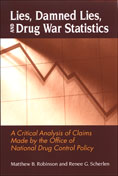A report by CNN's Anderson Cooper for Sixty Minutes on the "Stop Snitching" movement missed the mark widely. In this open letter to Cooper, DRCNet executive director David Borden lays out the real deal.
Two years ago, drug czar John Walters trumpeted rising cocaine prices as evidence the drug war was working. But the overall trend is toward lower prices and higher purity, and Walters doesn't want to talk about that.
Last Friday was 4/20, the unofficial holiday for marijuana aficionados. On campuses across the country, students came out. In Denver and Las Vegas, though, there were problems.
In addition to the weekly reporting you see here in the Chronicle, DRCNet also features daily content in the way of blogging, news links, redistributed press releases and announcements from our allies and more.
E-mails and phone calls are urgently needed to certain US senators to help repeal a bad law at the juncture of drug policy and education.
An important new book debunks literally years of statistical legerdemain by the nation's central drug policy office -- and is DRCNet's latest premium for our members.
Three police officers and a prison guard arrested, and another prison guard gets sent to prison. Once again, we present the corrosive impact of the drug war on police ethics and morality in all its mundane banality.
The Supreme Court heard oral arguments Monday in a case that revolves around whether passengers in a vehicle stopped by police are "seized" like the driver.
The opium economy is the leading employer in Afghanistan, despite limited eradication efforts funded by the west.
The Belgian and German governments are complaining about Dutch border city coffee shops that cater to their citizens, but a Dutch mayor suggests they just open their own.
With bloody drug prohibition-related violence unabated despite the latest round of government military offensives, leading members of Mexico's main opposition party are calling for drug legalization as way out.
Time on Ecstasy research, Radley Balko on Measuring Prohibitions, new CannabisResource site, Oaksterdam News, Drug Truth Network, HRC web site relaunch, Alternet on South America drug war.
Events and quotes of note from this week's drug policy events of years past.
The Open Society Institute seeks a full-time Program Officer in its New York office to assist with their Health Media Project.
Support the cause by featuring automatically-updating Drug War Chronicle and other DRCNet content links on your web site!
A new way for you to receive DRCNet articles -- Drug War Chronicle and more -- is now available.
Visit our new web site each day to see a running countdown to the events coming up the soonest, and more.
Dear Mr. Cooper:

David Borden
As a CNN viewer who generally appreciates your work, I was stunned by how badly your report on the "Stop Snitching" movement missed the mark. It's easy to find someone willing to make an extreme statement, as hip-hop artist Cameron Giles did when he said he wouldn't report a serial murderer. But do you really think the most extreme voice on the airwaves is the one that merits such a large portion of the face time in your report?
My issue is not with the criticisms leveled at people like Giles or the Stop Snitching movement. My concern is over that which was not said. For example, the most interesting moment in the piece was David Kennedy's comment about police tactics in the war on drugs. However, you did not offer even a second sentence about that on the screen (at least in the CNN version) for Prof. Kennedy to elaborate on what those tactics might be or why they might have such an effect. Do you really consider those three seconds to constitute an adequate fulfillment of your professional responsibility to provide balanced and informative reporting?
A real examination of the "snitching" issue was provided in Ofra Bikel's 1999 documentary for Frontline, "Snitch." One of the prisoners Bikel interviewed, Clarence Aaron, received three life sentences while in college at age 23 because of a minor role in a drug transaction -- "conspiracy," as the government calls it. All the other participants got less time, even though their responsibility level in the deal had been greater. Aaron's cousin James, in fact, was sentenced to mere probation -- in exchange for testifying against Aaron -- and walked out of the courtroom a free man.
According to Aaron, his cousin told him that he "had to do what [he] had to do" and that that included lying to the jury. One of the objectives of prosecutor Deborah Griffin, apparently, was to cause a mistrial and force Aaron to switch to a less skilled attorney than the one he had, and she was able to use James to manipulate the situation to bring that about. If James didn't cooperate, he told Aaron, she threatened to "put [him] in prison for the rest of [his] life."
Of course, Aaron is still in prison today. You can read a little more about him in a column by the San Francisco Chronicle's Debra Saunders here. She writes about him every year, at Christmas pardon time, so far to no avail.
Unfortunately, Aaron's case is unusual mainly for how much attention it's gotten. The exchange of leniency -- or even money -- for testimony that will help the prosecution is an absolutely routine tactic in the drug war. The DEA, in fact, continued to use a "super-snitch" named Andrew Chambers for numerous prosecutions after a court had determined him to be a repeat perjurer. Common sense tells us that testimony acquired in this way is not always reliable. It is a disgusting commentary on the state of our justice system that prosecutors would use a tactic like that so often. The fact that the mandatory minimum laws that garnered Aaron his life sentences were passed by Congress with neither hearings nor expert advice in other forms (according to my colleague Eric Sterling who appeared in Bikel's report), is equally troubling. The use of these laws to imprison minor offenders for long periods of time is also very common, but the term "mandatory minimum" did not appear in your report even once. Nor did you mention it was an anonymous informant's incorrect tip that led to the killing of 92-year old Kathryn Johnston by police officers in a no-knock raid in CNN's own hometown of Atlanta last year.
Research by the Sentencing Project has found that literally one in three young black men between the ages of 20 and 29 are under the supervision of the criminal justice system -- prison, jail, probation or parole -- on any given day. Here in Washington the numbers are even higher. How difficult must it be for all of these people with convictions on their records to go on to find legitimate jobs? What kind of impact does such a massive and ongoing operation have on the bonds of family, friendship, or community? How many of these people go to jail or prison, what kinds of things do they learn there, how many of them catch serious diseases there and bring them back out? How often do they receive harsh mandatory minimum sentences like Clarence Aaron? At a conference I attended recently, a professor from Morehouse College, lamenting the situation, delivered a talk entitled "Where are the Men?" What should we be doing differently, or for that matter what should we stop doing, in order to address this? What does all of this do to change people, mostly in ways that we don't want, to cause more crime? I simply do not believe that one in three black men in this age group are criminals in any meaningful sense of the word.
I respectfully suggest it is the overuse and misuse of the criminal justice system -- not the words of some rappers -- that are the primary reasons anti-police sentiment in some of our communities runs so deep. I urge you to do a follow-up report to take a deeper look at these issues. After all, just because Lou Dobbs thinks we can stop drugs at the border doesn't make it so -- and if we could people would just use more of the drugs that can be grown or manufactured here. We therefore need to change the way we deal with drugs in a fundamental sense. Ending the disgraceful practice of purchasing or coercing testimony from "snitches" to send people away for years or decades would be a start.
Don't be a part of the problem, Mr. Cooper, be a part of the solution -- talk about this.
Sincerely,

David Borden, Executive Director
Stop the Drug War
Washington, DC
http://stopthedrugwar.org
back to top
On Monday, the US Coast Guard unloaded nearly 20 tons of cocaine it had seized last month off the coast of Central America, the largest maritime drug bust in US history. Will it make any difference? Not if the history of US cocaine interdiction efforts is any indication.
Two years ago, the head of the Office of National Drug Control Policy (ONDCP), John Walters, proudly announced that interdiction and eradication efforts were working based on a rise in cocaine prices. But in a just-released study, "Connecting the Dots: ONDCP's (Reluctant) Update on Cocaine Price and Purity," the Washington Office on Latin America's (WOLA) John Walsh reports that Walters' loudly announced price increase was only a blip that has since been reversed. Unlike his earlier announcement, Walters has not trumpeted these findings.
Among the key points in the report:
- Preliminary US government data, quietly disclosed by ONDCP, indicate that cocaine's price per pure gram on US streets fell in 2006, while its purity increased. (Increasing purity effectively constitutes an additional price decrease.)
- These latest estimates, continuing a 25-year trend, suggest that cocaine supplies are stable or even increasing.
- This is so despite $31 billion spent on drug interdiction and crop control efforts since 1997, including $5.4 billion spent in Colombia -- the source of 90 percent of cocaine in the United States -- since "Plan Colombia" began in 2000.
- The updated cocaine data fully reverse a short-lived price increase that the White House drug czar's office heralded in late 2005. That rise in prices and decline in purity, which received much media attention at the time, proved to be a less than impressive fluctuation, as skeptics at the time suggested would be the case.
- The available evidence indicates that cocaine's continued low and falling prices are driven largely by ongoing robust cocaine supply, rather than by a slackening or collapse in demand.
- The new cocaine price and purity estimates offer further evidence that the continued US emphasis on forced crop eradication, with "Plan Colombia" as its most visible and costly centerpiece, has failed to affect drug supplies at home.
America's supply-side efforts to reduce cocaine use by stopping it from getting to the US have failed. Or, as Walsh put it: "A perennial goal of US anti-drug policy has been to disrupt supplies enough to constrain availability... this effort, however, has consistently failed to achieve lasting increases in drug prices or reductions in drug purity levels. Rather, cocaine prices have been in general decline since 1982. And according to new estimates, which the White House drug czar's office quietly provided to a US senator in January, this decline continued apace in 2006."
And while Walters and his fellow drug warriors are always promising that progress is just around the next corner, the annual Drug Threat Assessments from the National Drug Intelligence Center show that little changes:
- April 2004: "Both powder and crack cocaine are readily available throughout the country and overall availability appears to be stable."
- January 2005: "Key indicators of domestic cocaine availability show stable or slightly increased availability in drug markets throughout the country..."
- January 2006: "Cocaine is widely available throughout most of the nation, and cocaine supplies are relatively stable at levels sufficient to meet current user demand."
- October 2006: Despite record levels of cocaine lost or seized in transit toward the United States, "there have been no sustained cocaine shortages or indications of stretched supplies in domestic drug markets."
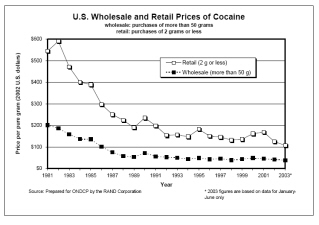
Purity-adjusted cocaine price chart, prepared for ONDCP by the RAND Corporation. (See the WOLA report for full-size version.)
"It's way past time to bring our expectations for this kind of drug control policy in line with reality," Walsh told Drug War Chronicle. "That reality is that the record makes clear it is extremely difficult to drive up prices for any length of time. We need to put the supply control effort in proper perspective: Even if in its best case scenario, it is preventing cocaine from being much more readily available, it is marginal to the real issue, which is the question of demand and the consequences of drug use."
As Walsh shows in great detail in the report, ONDCP suppresses the cocaine price and purity numbers that hurt it politically and trumpets those that support its claims. That's no surprise to Matt Robinson, professor of criminal justice at Appalachian State University and co-author of Lies, Damned Lies, and Drug War Statistics: A Critical Analysis of Claims Made by the Office of National Drug Control Policy.
"This is more of the same from ONDCP; it's not surprising at all, although it's very disappointing," said Robinson. "What we showed in our book is that they selectively choose and present statistics that support their case and they ignore or downplay statistics that don't support their case, and that's what this report shows them doing as well," he told the Chronicle.

coca eradication operation
Robinson also noted that when Walters trumpeted a blip upward in cocaine prices in 2005, ONDCP was up to its old trick of cherry-picking short-term data that supported its case while ignoring the overall trend over time. "Once again, we see a very short-term focus on a specific time period while ignoring long-term trends. That's exactly what we found historically."
"Unfortunately, this is not a surprise, more like par for the course. As we found several times looking at ONDCP over several years, this is a real typical pattern," said Renee Scherlen, professor of political science at Appalachian State and Robinson's coauthor. "In the present case, ONDCP chose to look at a snippet that doesn't really reflect a trend."
Academics and analysts aren't the only critics of ONDCP's "truthiness," to cite a term coined by Steven Colbert. Also skeptical is Sen. Charles Grassley (R-IA), who wrote Walters a year ago asking for clarification of his claims. ONDCP may be making selective use of statistics to "provide a rosier but not necessarily more accurate picture of the current situation." Grassley is still un-persuaded despite further correspondence with ONDCP. "When it comes to statistics, I think it's fair to say they cook the books," Sen. Grassley told National Public Radio in a recent interview. "They use whatever statistics fit their public relations program."

coca seedlings
The cure for ONDCP's mendacity lies with Congress, said Robinson. "The simplest thing is for Congress to hold them accountable," he said. "Congress could mandate annual performance evaluations, but it doesn't. Congress has a chance to reauthorize ONDCP every five years or so, and that could be another occasion, but Congress doesn't have to wait for that," he said.
"The idea of holding congressional hearings and asking for them to be held accountable through oversight is one path to follow," Scherlen concurred. "To analyze policy, we have to have accurate information. We want to know what works and what doesn't. You don't have to oppose the war on drugs to request that we have good information and that ONDCP present data that is truthful."
back to top
Last Friday was April 20 (4/20), the unofficial national marijuana smokers' holiday, and members of Cannabis Nation were out in force on college campuses across the land. Non-campus events took place, too, but some of them faced hostile reactions from local authorities -- most notably in Denver, where police cited more than 50 people on marijuana charges, and in Las Vegas, where the city bureaucracy effectively stifled a long-planned and costly two-day celebration of cannabis culture.
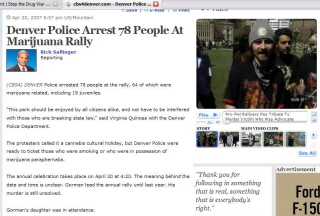
report by CBS Denver affiliate
The on-campus actions were, for the most part, organized by
Safer Alternatives for Enjoyable Recreation (SAFER), the Colorado-based group that has been working its "marijuana is safer than alcohol" message on college campuses and in the voting booth. According to the group, students on
50 campuses participated in 4/20 events under the rubric of a "National Day for Education."
In the SAFER events, which in many cases were coordinated with campus Students for Sensible Drug Policy (SSDP) and National Organization for the Reform of Marijuana Laws (NORML), students handed out literature comparing the effects of marijuana and alcohol and called for campus policies that do not punish marijuana use more severely than alcohol use.
"The campus events seemed to go very well," said SAFER head Mason Tvert. "All around the country, students handed out thousands of pieces of literature and SAFER t-shirts," he told Drug War Chronicle. "The literature contrasted the effects of marijuana and alcohol -- no marijuana ODs, it doesn't contribute to acts of violence and sexual assault, while alcohol is the number one campus date rape drug.
Judging by the response this week, the action was a success, Tvert said. "We've been getting lots of emails from people who say that literature, and the NORML and SSDP chapters are reporting that they signed on a lot of new members."

flyering by Univ. of Toledo SSDP member Whitney Bodine
"Some of our chapters worked with SAFER to distribute information about the relative effects of alcohol and marijuana," SSDP field director Micah Daigle told the Chronicle. Other chapters held or will hold hemp fests, he said.
While some SSDP chapters participated in 4/20 actions, others were busy lobbying Congress in an effort to repeal the Higher Education Act's anti-drug provision. "Last week was a week of SSDP HEA action," said Daigle. "We sent out phone script cards that people could use to encourage them to call the Senate HELP Committee, which is reviewing HEA this week."
There were other 4/20 campus actions unrelated to the SAFER campaign, although they hit some similar notes. In Amherst, Massachusetts, hundreds of people gathered Saturday for the 16th annual Extravaganja, organized by the University of Massachusetts Cannabis Reform Coalition (CRC).
CRC head John Werner touched on familiar themes as he addressed the crowd. "People are being kept out of college for small infractions," Werner said. He said that when people are jailed for marijuana offenses, it's harder to find a job when they're released. In turn, this may cause them to turn to crime.
The laws also takes resources away from combating more dangerous drugs. "I think there are drugs that are dangerous, and marijuana is not one of them," said Werner. "No one has ever died from a marijuana overdose."
Werner also addressed campus marijuana policies. "There's a huge problem with cops in dorms," said Werner. "There's a skyrocketing arrest rate." According to Werner, at UMass any student caught with marijuana is suspended immediately, which severely interrupts academic work and leaves a stain on the individual's record.
While the campus events were largely unmolested (six students at the University of Colorado were arrested for publicly smoking pot), it was a different story for 4/20 events in Denver and Las Vegas. In Denver, dozens of public marijuana smokers were cited by police, who massed in force around the peaceable rally memorializing slain activist Ken Gorman.
"People who smoke marijuana in public have to be ready to pay the consequences," said SAFER's Tvert. "But this is different from past years and it certainly shows the police were going out of their way to cite people. This was a peaceful gathering and the only problem was the arrests," he said.
According to Denver police, more than 100 officers, including the SWAT team, the mounted patrol, undercover members of the vice and narcotics bureau, the gang unit and other departments were on duty during the rally. "Even though marijuana smoking isn't illegal in Denver, it's still illegal in Colorado," said police spokeswoman Virginia Quinones.
But Tvert questioned the need for the massive police presence. "Do they call out the SWAT team for bar closing on Friday night?" he asked. "Do we get that much police presence at a Broncos football game?"
Tvert said he plans to pursue the issue by demanding hearings at the city council. SAFER was behind the successful 2005 legalization initiative ignored by city fathers, and Tvert warned that the city could see further action, perhaps in the form of a lowest law enforcement priority initiative, if the city doesn't change its tune.
4/20 in Las Vegas was supposed to be a two-day festival with dozens of live bands, vendors, and exhibitors, but instead turned into a disaster for organizers after city permitting officials stalled their permits, then shut them down completely on the first day of the event.
Mikki Norris of the Cannabis Consumers Campaign and her husband, cannabis cultivation expert Chris Conrad, traveled from the San Francisco Bay area to attend and address the event. They were expecting a major bash, but "when we arrived, the event had significantly reduced," Norris reported. "The venue, the Ice House, had been contacted by the authorities and were told that no vending could take place outside or inside, no speakers could speak, nobody could table or hand out literature. There could only be music in a place that holds a thousand people. Police were riding bikes through the large parking lot area that only weeks before had hosted an event by Snoop Dog and others. When the scent of cannabis was sniffed in the outside air, the code-enforcement person cancelled the event, threatening the owners of the Ice House to suspend their licenses for 30 days if they didn't call off the 4/20 event."
While Norris decried the hypocrisy of a city built on sex, drinking, and gambling shutting down a marijuana event, the damage was more than emotional. "Many people lost thousands of dollars on this weekend," she noted. "Many vendors lost money, the Ice House lost money, the musicians lost money, attendees lost money, and we lost money getting there. Much money was to be generated at this event, tourist dollars were going to be spent all over town, and the message was to get out about legalizing, taxing and regulating cannabis in Nevada in the near future. But, instead it was a big loss for everyone."
Nevada NORML organizers Billy and Beth Soloe are not answering their phone this week and their voicemail box is full. The couple stand to lose significant sums on the thwarted event.
They are not to blame, said NORML founder Keith Stroup, who also traveled to Las Vegas for the event."[The organizers] had an agreement with the venue that the Icehouse would handle permit issues because it's a venue that does these big events all the time, and only 11 days before the event, the Icehouse told them the permits weren't moving. At that point, Nevada NORML realized it had a problem and tried to get it resolved, but all they got was the runaround from city officials. They created an endless series of hurdles; I think it is clear there was never any intent to let this event happen."
Stroup wishes they had asked him for help. "I think the Nevada NORML people were well-intentioned and worked very hard, but they presumed city officials were dealing with them in good faith, and that's clearly not the case," said Stroup. "They should have called us for help when they realized this was a crisis. Perhaps we could have acted to clear this up, but by the time we got to town on the day of the event, it was too late to fix things. I told them that if they want to try it again next year and they don't have the permits six weeks out, bring us in and we'll take them to court."
City officials apparently acted at the behest of a Mormon anti-drug group that submitted a petition with 30 signatures demanding that the event be canceled, Stroup reported. "Not 30,000 signatures, not 3,000, but 30 signatures!" he exclaimed. "Clearly, they got to someone on the council, and mid-level bureaucrats were told not to grant that permit. Someone decided this wasn't healthy for the city, and they weren't going to let the event happen," he said.
"This was clearly a case where somebody didn't like the message," said Stroup. "The city was claiming this event was going to bring the city to a screeching halt, but this is Las Vegas. You've got to be kidding me. That was a bullshit justification by the city. We may have to go back with guns blazing next year."
To add insult to injury, city code enforcement officers even forbade event participants from handing out literature. "That's clearly unconstitutional," said Stroup. "If NORML wants to hand out a brochure on private property, that is their constitutional right."
Stroup said he spoke with the Icehouse manager and offered legal assistance if the venue challenged the literature ban, but the manager declined, saying city officials threatened to shut him down for at least 30 days. "At that point, we didn't have the option of challenging the city's bullshit decisions," Stroup said. "They could have destroyed that business."
Nevada NORML and national NORML are weighing their legal options at this point, Stroup said. "Suing for damages is not out of the question. Some people took a real financial hit on this," he said. "But if our main goal is to overcome these obstacles, we have to ask if we want to spend the time and resources to teach these people a lesson or would we be better off using that same energy to really do it right next time and cram it down the city's throat."
back to top
Along with our weekly in-depth Chronicle reporting, DRCNet has since late summer also been providing daily content in the way of blogging in the Stop the Drug War Speakeasy, as well as Latest News links (upper right-hand corner of most web pages), event listings (lower right-hand corner) and other info. Check out DRCNet every day to stay on top of the drug reform game!
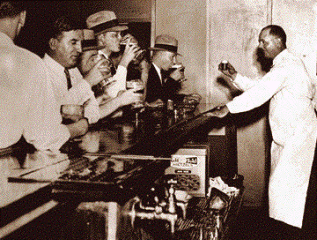
Speakeasy photo (courtesy arbizu.org)
Chronicle editor Phil Smith was traveling most of this week, and so most of this week's blogging was done by content editor Scott Morgan. Scott contributed "ONDCP Admits Exaggerating Marijuana Potency," "Wanna Beat a Drug Test? Switch From Pot to Oxycodone," and "False Positives: The Dark Secret of the Drug Testing Regime."
Also joining us this week was Univ. of Las Vegas professor Randall Shelden, who contributed "Review of Lies, Damned Lies and Drug War Statistics by Matt B. Robinson and Renee G. Scherlen (SUNY Press, 2007)."
Check them out at http://stopthedrugwar.org/speakeasy -- we encourage you to post comments.
Also check out our "In the Trenches" activist feed for a plethora of press releases, action alerts, job listings and other interesting items reposted from many allied organizations around the world. And please join our Reader Blogs where you can become an author in the DRCNet community too.
Thanks for reading, and writing...
back to top
Earlier this week, DRCNet issued action alerts to our subscribers from 21 different states that are represented on the US Senate's Health, Education, Labor and Pensions (HELP) Committee, asking for phone calls to be made and e-mails sent in support of including full repeal of the Higher Education Act's (HEA) drug provision in the pending Senate HEA reauthorization bill. Special thanks to the hundreds of you who responded to this call to action -- we have reason to believe it has made a difference!
If you are from one of the applicable states, and have not yet e-mailed your senator who is a member of HELP, please visit http://www.RaiseYourVoice.com/senate to speak up (or http://www.RaiseYourVoice.com to learn more about the issue). Those states are: Alaska, Colorado, Connecticut, Georgia, Illinois, Iowa, Kansas, Maryland, Massachusetts, New Hampshire, New Mexico, New York, North Carolina, Ohio, Oklahoma, Rhode Island, Tennessee, Utah, Vermont, Washington and Wyoming.
Also, please call your senator's office to register your opinion that way too -- a phone call usually makes more of an impact than an e-mail -- and drop us an e-mail at borden@drcnet.org to let us know. Visit http://www.RaiseYourVoice.com/senate for talking points and further information to help with your call. The senator's phone numbers are as follows:
Alaska: Senator Lisa Murkowki, (202) 224-4654
Colorado: Senator Wayne Allard, (202) 224-5941
Connecticut: Senator Christopher Dodd, (202) 224-2823
Georgia: Senator Johnny Isakson, (202) 224-3643
Illinois: Senator Barack Obama, (202) 224-2854
Iowa: Senator Tom Harkin, (202) 224-3254
Kansas: Senator Pat Roberts, (202) 224-4774
Maryland: Senator Barbara Mikulski, (202) 224-4654
Massachusetts: Senator Ted Kennedy, (202) 224-4543
New Hampshire: Senator Judd Gregg, (202) 224-3324
New Mexico: Senator Jeff Bingaman, (202) 224-5521
New York: Senator Hillary Rodham Clinton, (202) 224-4451
North Carolina: Senator Richard Burr, (202) 224-3154
Ohio: Senator Sherrod Brown, (202) 224-2315
Oklahoma: Senator Tom Coburn, (202) 224-5754
Rhode Island: Senator Jack Reed, (202) 224-4642
Tennessee: Senator Lamar Alexander, (202) 224-4944
Utah: Senator Orrin Hatch, (202) 224-5251
Vermont: Senator Bernard Sanders, (202) 224-5141
Washington: Senator Patty Murray, (202) 224-2621
Wyoming: Senator Michael Enzi, (202) 224-3424
Thank you for taking action. DRCNet has been fighting against this law since it was passed in 1998, and with your help we could actually win it now!
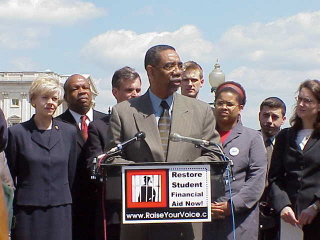
Ten members of Congress spoke at the press conference we organized for the Coalition for Higher Education Act Reform in 2002.
back to top
Normally when we publish a book review in our
Drug War Chronicle newsletter, it gets readers but is not among the top stories visited on the site. Recently we saw a big exception to that rule when more than 2,700 of you read our review of the new book Lies, Damned Lies, and Drug War Statistics: A Critical Analysis of Claims Made by the Office of National Drug Control Policy. Much of this reading took place during a week that had other very popular articles as well, so clearly the topic of this book, which was authored by respected academics Matthew Robinson and Renee Scherlen, has struck a chord. As well it should.
Please help DRCNet continue our own work of debunking drug war lies with a generous donation. If your donation is $32 or more, we'll send you a complimentary copy of Robinson and Scherlen's book to help you be able to debunk drug war lies too.
Over the coming weeks I will be blogging on our web site about things I've learned reading Lies, Damn Lies, and Drug War Statistics. Stay tuned!
Your donation will help DRCNet as we advance what we think is an incredible two-year plan to substantially advance drug policy reform and the cause of ending prohibition globally and in the US. Please make a generous donation today to help the cause! I know you will feel the money was well spent after you see what DRCNet has in store. Our online donation form lets you donate by credit card, by PayPal, or to print out a form to send with your check or money order by mail. Please note that contributions to the Drug Reform Coordination Network, our lobbying entity, are not tax-deductible. Tax-deductible donations can be made to DRCNet Foundation, our educational wing. (Choosing a gift like Lies, Damn Lies, and Drug War Statistics will reduce the portion of your donation that you can deduct by the retail cost of the item.) Both groups receive member mail at: DRCNet, P.O. Box 18402, Washington, DC 20036.
Thank you for your support, and hope to hear from you soon.
Sincerely,

David Borden
Executive Director
P.S. You can read Chronicle editor Phil Smith's review of the book here.
back to top
Three police officers and a prison guard arrested, and another prison guard gets sent to prison. Once again, we present the corrosive impact of the drug war on police ethics and morality in all its mundane banality. Let's get to it:
In Gettysburg, Pennsylvania, the former police chief is charged with leaking word of an impending drug raid. Former Chief Rolf Garcia and his 17-year-old son were arrested April 19 on charges Garcia told his son about a looming raid in February 2006, and his son called four other people to warn them. As a result, two men escaped the residence that was the target of the raid before they could be identified. Garcia told a grand jury that while he never told his son the location of a planned raid, he might have warned him to stay away from a certain area. His son testified that he had provided false information about drug busts in the past to obtain marijuana, but he denied telling anyone about the raid in question. Garcia and his son are charged with hindering apprehension or prosecution, while Garcia is also charged with obstruction of justice. A preliminary hearing is set for May 24. [Ed: Whether reformers should be upset about Garcia's actions in this case is another question.]
In Columbus, Georgia, a Columbus police officer has been arrested for cocaine trafficking.
Officer Larry Lightning, a 23-year veteran of the department, was arrested last Friday after a two-year investigation by the Columbus office of the FBI, the Columbus Police Department, the Georgia Bureau of Investigation, and the Metro Narcotics Task Force. He faces federal charges of conspiracy to possess with intent to distribute cocaine base, extortion by a public official, and possession of a firearm in furtherance of a drug trafficking crime.
In Evansville, Indiana, an Evansville police officer will soon face trial for allegedly stealing money from a drug suspect. Officer Gerald Rainey, 33, faces one count of felony theft for allegedly taking $1,000 out of a backpack containing $19,500, which he seized from a cocaine dealing suspect. The accused dealer cried foul, police investigated, and they found the missing $1,000 in Rainey's patrol car. He faces a June 27 court date.
In Garden City, New York, a New York City jail guard was charged with supplying heroin to the Shinnecock Indian Reservation. Gary Morton, 25, surrendered to state police last Friday as part of the roll-up of a drug distribution network on the reservation, which is on the eastern end of Long Island. Morton was one of more than a dozen people arrested. He is charged with second-degree conspiracy. Authorities planned to arrest him at his job at Rikers Island, but he didn't show up for work, instead turning himself in later that day.
In Sacramento, a former prison guard was sentenced to prison for smuggling methamphetamine in to inmates. John Charles Whittle, 47, a 22-year veteran of the California Department of Corrections, pleaded guilty last month. He was busted after internal affairs agents intercepted a package of meth sent to Whittle's home, then raided the residence after he accepted delivery. The former guard at Mule Creek State Prison admitted to receiving more than $5,000 to smuggle drugs into the prison. He will now serve two years himself.
back to top
When police pull over the driver of a vehicle, are they also "seizing" the vehicle's passengers? That's the question the US Supreme Court pondered Monday as it heard oral arguments (transcript here) in the case of a California man arrested on methamphetamine charges after the vehicle in which he was riding was pulled over. Questions from the justices suggested they would not feel free to leave if they were passengers in a vehicle pulled over by police, and if that sentiment holds, the court could rule that passengers have the right to make Fourth Amendment challenges to any evidence seized and used against them.

US Supreme Court
The case pits the state of California against Bruce Brendlin, a former convict wanted for parole violation. Brendlin was a passenger in a car pulled over ostensibly to inspect possibly expired inspection tags. The officer recognized Brendlin, arrested him, searched the car, found methamphetamine supplies, and added a drug offense to the charges.
Brendlin eventually pleaded guilty, but appealed on the ground that the evidence should have been suppressed because the traffic stop was later found to be bogus. (The officer already knew the tags were good because he had stopped the car earlier that same day). The California Supreme Court rejected Brendlin's appeal, holding that only the driver had been "seized" during the traffic stop -- not Brendlin -- and thus Brendlin had no basis for challenging an illegal search.
Brendlin's attorney, Elizabeth Campbell, told the court that when a police officer pulls over a vehicle, "he seizes not only the driver of the car but also the car and every person and everything in that car."
California Deputy Attorney General Clifford Zall argued that it is only the driver, not the passenger, who is "seized" because it is the driver who submits to the officer's authority. That caused some skepticism among the justices, a majority of whom indicated through their comments that they believe passengers as well as the driver are "seized." That is also the position of the courts in most states.
While Brendlin appears likely to prevail on this issue, he is still likely to be imprisoned as a parole violator. Still, what would likely be a symbolic victory for Brendlin could become a substantive victory for the rest of us.
back to top
The opium trade generates $6.7 billion a year, with much of that money staying in the hands of farmers and local traffickers, Afghan Deputy Interior Minister Mohammed Daud Daud told reporters at a Kabul press conference last Friday.

opium poppies
The opium trade also generates jobs, creating posts for some 110,000 Afghans involved in the traffic, Daud said, citing figures from the UN Office on Drugs and Crime (UNODC). That's not including the two million people involved in poppy production across the country. Daud estimated that farmers garner about 20% of the money generated, or about $1.4 billion last year, making opium far and away the country's top cash crop.
The division of proceeds between Afghan and foreign traffickers is unknown. Also unknown is just how much of the profits are ending up in the coffers of the Taliban and Al Qaeda, although all observers conclude they, too, are profiting from the trade.
They're not the only ones. Daud told the press conference anti-drug forces had arrested more than a thousand people in the past three years, including government officials.
Afghanistan provides more than 90% of the global opium supply, from which heroin is derived. According to the UNODC, this year's harvest will be another record-breaker, despite the limited eradication efforts of the Afghan government and its Western backers.
back to top
Gerd Leers, the mayor of the Dutch border town of Maastricht, has called for neighboring Belgium and Germany to open their own cannabis coffee shops and regulate the sale of marijuana in a bid to reduce the flow of "drug tourists" pouring into his city. He also said the regulation of cannabis is a problem that should be addressed at the European level.

downstairs of a coffee shop, Maastricht (courtesy Wikimedia)
"The best way out of the problem is for Europe's political leaders to sit together, listen to these problems and open their eyes for a real solution," Leers said.
The German and Belgian governments have complained for years that their citizens are going to Holland to purchase cannabis. Dutch authorities, meanwhile, complain of crime and congestion associated with foreigners at the coffee shops, and the conservative Dutch government is considering various schemes to bar foreigners from enjoying the shops. An estimated 1.5 million "drug tourists" visit Maastricht each year, according to official estimates.
Leers' comments came in an interview with EUX-TV, in which he responded to an angry letter sent by Belgian Prime Minister Guy Verhoftstadt to Dutch Prime Minister Jan-Peter Balkenende. Verhoftstadt was objecting about Maastricht plans to relocate some of its coffee shops to within walking distance of the Belgian border.
While Belgium has decriminalized marijuana possession, it has no provision for the supply of cannabis. But Verhoftstadt's complaints may have more to do with a pending Belgian parliamentary election, and Belgium is part of the problem anyway, said Leers.
"Verhofstadt should first carefully read my proposals and my ideas, instead of presenting them in a simplistic way to the people during an election campaign," he said. "The point is that he does not have a clear idea about what I am doing. I invite him to discuss this. We are not bringing our coffee shops to the border... we are just trying to overcome the problems around the coffee shops, to make them manageable," he said.
Belgium should deal with its marijuana users at home, Leers said. "What he is doing, he is bringing his clients to Maastricht, and then you should be fair. Either he bans the use of drugs completely, and fights against it. Or he should give it free and organize a way of selling these drugs to the people. But he should not complain because Maastricht is trying to get rid of all these problems that are caused by the Belgians themselves," Leers complained. "They say that we are exporting our drugs problems because we have our so-called coffee shops where you can use small amounts of drugs. But it's exactly the other way round. They are causing our problems because they are sending their clients, their inhabitants because in Belgium and Germany you can't buy it."
While conservative European governments insist that the Dutch could solve the problem by shutting down their coffee shops, Leers begged to differ. "If closing them were the solution, I would be the first one to do it," he said. "But the point is -- and it's been proven -- is that if you 'say no to drugs,' it goes underground. It becomes illegal and then the problem would be even worse. I think it's better to regulate and keep your hands on it than to close your eyes. Be open for new solutions, because the way we are doing it now, we are losing, and the criminals will be the winners, the big winners. They earn a lot of money. Let's stop that. Let's organize it. Let's regulate it, so that we can clear it up for our people."
back to top
With the death toll from drug prohibition-related violence in Mexico at around 600 so far this year, the country appears to be on a path to match or exceed the 2,000 drug war deaths reported last year. While military operations authorized by incoming President Felipe Calderon of the National Action Party (PAN) have led to arrests and drug seizures, they appear to have had no substantive impact on the multi-billion dollar a year business of supplying Americans with the illegal drugs they demand.

Javier González Garza
Now, as the nation ponders a fundamental reform of the government itself, the leading opposition party, the Party of the Democratic Revolution (PRD) is calling for a National Agreement to Combat Organized Crime (read: the drug trade), which would include discussion of legalizing drugs.
The first rumblings came in the middle of last week, when Javier González Garza, the PRD's legislative coordinator in the Assembly, called for an end to the drug war. The endless war against the so-called drug cartels is fruitless, he said in an interview posted on the party web site.
"I believe that we cannot continue with this affair thinking we are going to combat the problem of the drug traffic without more radical measures," said González Garza. "One of these has to be the legalization of drugs in the United States. Then, we could begin to change things. Those military operations during this presidency, it's obvious that they are not obtaining results. I think that the US is the largest market and because of that, there is where we can achieve an international accord where we can pass to the next level, to legalize the consumption of certain types of drugs, and then eliminate this type of thing that is happening. That's one part," he said.

René Arce Islas
"The other part has to do with being able to think of other actions," González Garza continued. "This war, as it is now conceived, will cause us to lose everything; it doesn't make any sense. There have to be changes in that."
Then, last Friday, PRD Sen. René Arce Islas, secretary of the Senate's Public Security Commission, proposed the "National Agreement to Combat Organized Crime," including drug legalization. Ending drug prohibition is controversial, but reasonable, said Arce. "Evidently, that is a radical action that generates much controversy, but if we analyze it with maturity and serenity, evaluating the pros and cons, the risks and potential benefits, you cannot discard being able to arrive at an agreement that would, from our point of view and many specialists, do away with the drug traffic and the delinquency that accompanies it."
The PRD and its allies control 157 seats in the 500-seat Assembly, while the PAN controls 206, and the party of the former "perfect dictatorship," which ruled Mexico for seven decades, the PRI, is reduced to third place with 106 seats. In the last legislative session, a bill that would have decriminalized drug possession in Mexico was on the verge of passage when pressure from the United States caused then President Vicente Fox to back away. Will another year's worth of drug prohibition-related horrors lead to a different result this time around?
back to top
"Was Timothy Leary Right?" Time magazine article on the four MAPS-prompted therapeutic Ecstasy studies in the US and Britain.
CannabisResource, new web site featuring an extensive compilation of links, flyers and other info relating to marijuana activism.
Radley Balko on "Measuring Prohibitions"
The Harm Reduction Coalition has relaunched its web site, featuring training calendars, an online action center, a searchable map to share harm reduction resources and services, a job board, and more coming soon.
The Oaksterdam News, Spring 2007 Issue
"The US 'War on Drugs' Is an Assault on South America's Poorest," Benjamin Dangl of AKPress on Alternet
Drug Truth Network update:
Cultural Baggage for 04/20/07, PANEL II: Are we winning the war on drugs? with Stan Furce of HIDTA/ONDCP, Marcia Baker of Phoenix House and DTN/LEAP member Dean Becker + Drug War Facts, Bruce Mirken of MPP, Corrupt Cop Story, Poppygate, Tribute to Albert Hoffman
Century of Lies for 04/20/07:
Steve Bloom, editor High Times magazine + Irv Rosenfeld who has received 225 pounds of marijuana FROM THE US GOVERNMENT and Phillippe Lucas of Vancouver Island Compassion Society
back to top
April 27, 1937: In a statement before the US House of Representative Ways and Means Committee, Clinton Hester testifies that a Washington Times editorial published shortly before Congress held its first hearing on the marijuana issue argued: "The fatal marihuana cigarette must be recognized as a deadly drug and American children must be protected against it."
May 1, 1972: Nobel Prize laureate for economics Milton Friedman is quoted in Newsweek: "Legalizing drugs would simultaneously reduce the amount of crime and raise the quality of law enforcement. Can you conceive of any other measure that would accomplish so much to promote law and order?"
April 30, 1984: Colombian Minister of Justice Rodrigo Lara Bonilla, who had crusaded against the Medellin cartel, is assassinated by motorcycle-riding contract killers. President Belisario Betancur, who had opposed extradition, announces "We will extradite Colombians." Carlos Lehder is the first to be put on the list. The crackdown forces the Ochoa family, Escobar, and Oscar Rodriguez Gacha to flee to Panama for several months. A few months later, Escobar is indicted for Lara Bonilla's murder and names the Ochoas and Rodriguez Gacha as material witnesses.
May 3, 1994: Dear Abby states publicly in her column that "Just as bootleggers were forced out of business in 1933 when Prohibition was repealed, making the sale of liquor legal (thus eliminating racketeering), the legalization of drugs would put drug dealers out of business. It also would guarantee government approved quality, and the tax on drugs would provide an ongoing source of revenue for drug-education programs."
April 29, 1996: At a speech at a Miami high school, President Clinton calls for a war on drugs -- for the second time. Gen. Barry McCaffrey, the nation's drug czar, told the Cleveland Plain Dealer on May 1 that "everything the president has announced is already being done. There's nothing new here."
May 2, 2001: The Louisiana Senate, voting 29-5, passes sweeping legislation to bring relief to an overflowing state prison system, including ending mandatory prison time for possession of small quantities of drugs.
May 1, 2003: The Illicit Drug Anti-Proliferation Act of 2003 (IDAPA) is signed into law, among other things amending a section of the Controlled Substances Act to target rave organizers. It shifts the statute's emphasis from punishing those who establish places where drugs are made and consumed, such as "crack houses," to those who knowingly maintain "drug-involved premises," including outdoor events such as rock concerts. In addition to the criminal penalties in the original statute, the amended statute adds a civil penalty, thereby lowering the standard of proof from beyond a reasonable doubt to a preponderance of evidence.
back to top
The Open Society Institute seeks a full-time Program Officer in its New York office to assist with the Institute's Public Health Program's (PHP) Health Media Project. This cross-cutting project aims to improve the capacity of public health NGOs to utilize media and to communicate effectively with the public and policy makers, and to facilitate the ability of media to raise awareness about marginalized populations and stigmatized issues. These issues include harm reduction, Roma health, palliative care, sexual health and rights, and human rights and health.
The Public Health Program aims to promote health policies based on social inclusion, human rights, justice, and scientific evidence. The Program works with civil society organizations within two fields: promoting the participation and interests of socially marginalized groups in public health policy and fostering greater government accountability and transparency through civil society monitoring and advocacy, with a particular emphasis on HIV and AIDS. Program areas focus on addressing the human rights and health needs of marginalized persons, facilitating access to health information, and advocating for a strong civil society role in public health policy and practice. For further information on PHP, visit http://www.soros.org/health online.
The Health Media Program Officer will report to the PHP Deputy Director in New York. Responsibilities include facilitating the further development of PHP's health media funding strategy; overseeing health media grant giving, including drafting of requests for proposals, solicitation and evaluation of proposals, preparation of documentation, follow-up with grantees, program monitoring and evaluation; identifying and facilitating media technical assistance for grantees and partners; working with Soros foundations, OSI offices, experts and partners on program development and collaboration; developing joint initiatives with OSI's Media Program, which seeks to promote independent, professional, and viable media and quality journalism; organizing, coordinating, and traveling to meetings, conferences, partnerships, and special events; preparing background papers, literature reviews, and information searches, planning, tracking and managing the health media budget; and conducting other project activities as assigned.
Qualifications include a minimum of five years work experience in media, communications, or journalism; a Master's degree in media/journalism/communications preferred; previous NGO work experience and knowledge of HIV/AIDS preferred; work experience in CEE/FSU and/or southern/eastern Africa; excellent written, verbal and organizational skills; a commitment to working as a member of a team as well as commitment to excellence; flexibility and willingness to work simultaneously on a wide range of tasks and projects and ability to prioritize tasks; the ability to listen and communicate clearly and effectively with people from diverse cultures and backgrounds; attention to detail and the ability to work well under pressure; a pleasant, diplomatic manner and disposition in interacting with senior management, co-workers and the general public; and knowledge of at least one foreign language is a plus.
The salary is commensurate with experience, and the position starts immediately.
To apply, send résumé and cover letter to: humanresources@sorosny.org -- be sure to include "PHP" in subject line. You can also mail or fax: Open Society Institute, Human Resources -- PHP, 400 West 59th Street, New York, New York 10019, fax: (212) 548-4675. No phone calls please. The Open Society Institute is an Equal Opportunity Employer.
The Open Society Institute (OSI) works to build vibrant and tolerant democracies whose governments are accountable to their citizens. Open societies are characterized by the rule of law; respect for human rights, minorities, and a diversity of opinions; democratically elected governments; market economies in which business and government are separate; and a civil society that helps keep government power in check. To achieve its mission, OSI seeks to shape public policies that assure greater fairness in political, legal, and economic systems and safeguard fundamental rights. On a local level, OSI implements a range of initiatives to advance justice, education, public health, and independent media. At the same time, OSI builds alliances across borders and continents on issues such as corruption and freedom of information. OSI places high priority on protecting and improving the lives of marginalized people and communities.
back to top
Are you a fan of DRCNet, and do you have a web site you'd like to use to spread the word more forcefully than a single link to our site can achieve? We are pleased to announce that DRCNet content syndication feeds are now available. Whether your readers' interest is in-depth reporting as in Drug War Chronicle, the ongoing commentary in our blogs, or info on specific drug war subtopics, we are now able to provide customizable code for you to paste into appropriate spots on your blog or web site to run automatically updating links to DRCNet educational content.
For example, if you're a big fan of Drug War Chronicle and you think your readers would benefit from it, you can have the latest issue's headlines, or a portion of them, automatically show up and refresh when each new issue comes out.
If your site is devoted to marijuana policy, you can run our topical archive, featuring links to every item we post to our site about marijuana -- Chronicle articles, blog posts, event listings, outside news links, more. The same for harm reduction, asset forfeiture, drug trade violence, needle exchange programs, Canada, ballot initiatives, roughly a hundred different topics we are now tracking on an ongoing basis. (Visit the Chronicle main page, right-hand column, to see the complete current list.)
If you're especially into our new Speakeasy blog section, new content coming out every day dealing with all the issues, you can run links to those posts or to subsections of the Speakeasy.
Click here to view a sample of what is available -- please note that the length, the look and other details of how it will appear on your site can be customized to match your needs and preferences.
Please also note that we will be happy to make additional permutations of our content available to you upon request (though we cannot promise immediate fulfillment of such requests as the timing will in many cases depend on the availability of our web site designer). Visit our Site Map page to see what is currently available -- any RSS feed made available there is also available as a javascript feed for your web site (along with the Chronicle feed which is not showing up yet but which you can find on the feeds page linked above). Feel free to try out our automatic feed generator, online here.
Contact us for assistance or to let us know what you are running and where. And thank you in advance for your support.
back to top
RSS feeds are the wave of the future -- and DRCNet now offers them! The latest Drug War Chronicle issue is now available using RSS at http://stopthedrugwar.org/chronicle/feed online.
We have many other RSS feeds available as well, following about a hundred different drug policy subtopics that we began tracking since the relaunch of our web site this summer -- indexing not only Drug War Chronicle articles but also Speakeasy blog posts, event listings, outside news links and more -- and for our daily blog postings and the different subtracks of them. Visit our Site Map page to peruse the full set.
Thank you for tuning in to DRCNet and drug policy reform!
back to top
With the launch of our new web site, The Reformer's Calendar no longer appears as part of the Drug War Chronicle newsletter but is instead maintained as a section of our new web site:
- Visit http://stopthedrugwar.org each day and you'll see a listing of upcoming events in the page's righthand column with the number of days remaining until the next several events coming up and a link to more.
- Check our new online calendar section at to view all of them by month, week or a range of different views.
- We request and invite you to submit your event listings directly on our web site. Note that our new system allows you to post not only a short description as we currently do, but also the entire text of your announcement.
The Reformer's Calendar publishes events large and small of interest to drug policy reformers around the world. Whether it's a major international conference, a demonstration bringing together people from around the region or a forum at the local college, we want to know so we can let others know, too.
But we need your help to keep the calendar current, so please make sure to contact us and don't assume that we already know about the event or that we'll hear about it from someone else, because that doesn't always happen.
We look forward to apprising you of more new features on our web site as they become available.
back to top










